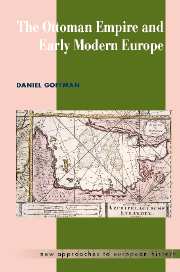Book contents
- Frontmatter
- Contents
- List of illustrations
- List of maps
- Preface
- Acknowledgements
- Note on usage
- Chronological table of events
- The Ottoman House through 1687
- 1 Introduction: Ottomancentrism and the West
- Part 1 State and society in the Ottoman world
- Kubad's formative years
- 2 Fabricating the Ottoman state
- Kubad in Istanbul
- 3 A seasoned polity
- Kubad at the Sublime Porte
- 4 Factionalism and insurrection
- Part 2 The Ottoman Empire in the Mediterranean and European worlds
- Glossary
- Suggestions for further reading
- Index
- NEW APPROACHES TO EUROPEAN HISTORY
4 - Factionalism and insurrection
from Part 1 - State and society in the Ottoman world
Published online by Cambridge University Press: 05 June 2012
- Frontmatter
- Contents
- List of illustrations
- List of maps
- Preface
- Acknowledgements
- Note on usage
- Chronological table of events
- The Ottoman House through 1687
- 1 Introduction: Ottomancentrism and the West
- Part 1 State and society in the Ottoman world
- Kubad's formative years
- 2 Fabricating the Ottoman state
- Kubad in Istanbul
- 3 A seasoned polity
- Kubad at the Sublime Porte
- 4 Factionalism and insurrection
- Part 2 The Ottoman Empire in the Mediterranean and European worlds
- Glossary
- Suggestions for further reading
- Index
- NEW APPROACHES TO EUROPEAN HISTORY
Summary
The reaya no longer obeyed the sovereign's command; the soldiers turned against the sultan. There was no respect for the authorities and they were attacked not by words but blows. All acted as they pleased. As tyranny and injustice increased, people in the provinces began to flee to Istanbul. The old order and harmony departed. When these have finally collapsed, catastrophe will surely follow.
This, also, is not concealed from the heart of the truth-seeker: in the Sublime State, in every period, the influence of speech and free action has fallen to the share of one group [or another]. And then until the time when, divine will permitting, influence and control pass from that corps to another corps, it is no more than natural for each group to vaunt itself foolishly while it has the royal favor and to rejoice in receiving profits to its heart's content. But one must add at least this much: those who attain to glory and favor through especial fortune of this sort must, no matter who they are, behave with good sense, and must not fail to observe the limits which the rights of God and of the people constitute.
However invincible the Ottoman military machine seemed through much of the sixteenth century, however coherent Ottoman society seems to have become, and however much money poured into the state coffers, as a monarchy the empire remained dependent upon the abilities of a single man.
- Type
- Chapter
- Information
- The Ottoman Empire and Early Modern Europe , pp. 98 - 128Publisher: Cambridge University PressPrint publication year: 2002

